Paula Vince's Blog: The Vince Review, page 66
January 8, 2016
'Good Things' by Kevin Gerald

Take a fresh look around you with eyes that cut through the daily distortions and see the undeniable and extravagant goodness of God.
There are certain messages today, both outside and inside the church, that have tainted the true message of God’s favor. The reality is God isn’t obligated to provide good things for us—but He wants to! This is your opportunity to adopt a favor-minded mentality and realize that God’s favor, like His grace, is unearned, limitless, and never-ending. And, it’s for us!
In Good Things, Kevin Gerald invites you to become a good finder.
MY THOUGHTS:
It's good to see a book about divine favour which focuses more on acknowledging and expressing thanks for what we've already got, rather than giving us tips to stir up more and more. I've read several of the latter sort over the years, and often what they stir up is a feeling of discontent and falling short.
Kevin Gerald begins with the premise that our attitude should be like wearing polarised sunglasses. What we choose to look at comes out in sharpest focus, whether we choose a positive or negative stance. Choosing to focus on the good isn't denying life's ups and downs, but helps us to notice little blessings we might otherwise overlook.
The book points out that so many of us unconsciously live from the premise that we don't have approval and need to earn it. This mindset is backed up by Old Testament stories about God choosing to turn away from his people for whatever reason. Reading them may fuel a common belief that God's favour is performance based, but Gerald discusses how the new era of New Testament grace is completely different. The 'on again, off again' relationship between God and his people is a thing of the past, but it's so easy not to grasp that. That's why we buy into the stress and burn-out of making approval earning our way of living.
Using stories, examples and personal anecdotes, this book is a great reminder that we should live from the premise that we already have approval, then look for signs of that, because we're bound to see them.
Thanks to Blogging for Books and WaterBrook Multnomah for giving a review copy through Net Galley.
4 stars
Published on January 08, 2016 17:04
January 6, 2016
'An Astronaut's Guide to Life on Earth' by Chris Hadfield

I picked this one up from the library because someone had called it one of their favourite, mood-lifting books. This retired astronaut describes some of his space missions in interesting detail, but the deeper purpose of his book is to share some hard-learned wisdom. Hadfield believes it has spilled over to help his life on earth run smoother, and hopes the same may apply for his readers. Some of the problem areas he highlighted have certainly struck a chord with me, helping me understand whey they've been problem areas. There are several, and I'll focus on the ones which were most meaningful for me.
1) Keeping your attitude on an even keel.
The ratio of working hard on earth to launching out in space averages several years: a couple of days. Any sudden hitch may completely derail an astronaut's chance of joining a space mission. You must work with the knowledge that you may well be one of those who never go up at all, so it's best to make up your mind to feel good about the work you do during your long, unheralded, working, learning life on earth. As too many variables are out of your control, you might as well manage the only one you have any control over; your attitude.
In terms of my writing, as a school kid I'd dream of hitting best-seller lists and earning big money. But out of trillions of writers, very few ever make it to the very tip of the peak, so realistically, why should I be one of them? Just plugging on and enjoying the process makes far more sense. The work is fun and rewarding for its own sake.
2) Aim to be a zero.
He identifies just three types of people present on any space mission. Minus 1s are pains in the neck who make a shared experience miserable. Zeros are neutral, adding nothing either way. And Plus 1s are those who add something positive and good to everyone's benefit. Hadfield has noticed that although everyone wants to be a Plus 1, those who make too big an effort to prove themselves worthy of the title tend to be regarded as Minus 1s. The real Plus 1s tend to be quiet, get-on-with-the-job types who don't scramble for attention. His advice is that the best, round-about way to possibly become a Plus 1 is to simply aim to be a zero.
I'm sure we've all noticed that those who try to crowd themselves into the spotlight become wearing very fast, and I've always had a niggling feeling this might be the case whenever I've tried to do it.
3) Don't focus on what the world might call your proudest moments.
If you take all the hype to heart and set the bar so high, you'll feel like a failure most of the time. He makes sure the medium and small moments that nobody knows about but him get the significance they deserve in his own mind. The challenge, he says, is to avoid being derailed by big, shiny moments that turn other people's heads. 'It's a given that today's star will be tomorrow's stagehand,' he says, meaning that the significance of your work shouldn't be determined by how visible it is to outsiders.
Bursts of glory from big moments fade quickly and are eventually remembered only by the participants themselves, no matter who you are. You must accept that the spotlight will move on, or you'll either be hobbled by self-importance or fear nothing else you do will ever measure up, is Colonel Hadfield's advice. It's sad to be mired in the quicksand of bygone celebrity.
He reminds us that most people applaud the wrong things anyway. They are impressed by dramatic, record-setting sprints rather than years of dogged perseverance. What really matters isn't the value someone else assigns to a task but how you personally feel while performing it. When you limit success to peak, high-visibility experiences, you're destined to feel unfulfilled. That's why Chris Hadfield urges us to change our own idea of success and lower the bar.
So for me, writing a review which is done in a couple of hours maximum is no less worthy than writing a novel like Picking up the Pieces that sold a couple of thousand copies and won an award, which is probably what I would consider one of my favourite achievements to date. It shouldn't necessarily be the case. That leads to my most memorable quote in this book.
Life is a lot better if you feel you're having ten wins a day, rather than a win every ten years or so!
Published on January 06, 2016 16:17
January 3, 2016
Writing and Walking go Together

I was surprised to read somewhere that the concept of walking for pleasure is reasonably recent. Recreational walking was only made fashionable in the nineteenth century, by writers such as Wordsworth, Thoreau and Baudelaire. Before then, apparently it was far more prosaic and purposeful. You'd walk to get from one destination to the next and not take a step further, no matter how picturesque the scenery. Can you believe that? I know people didn't have much free time in the Middle Ages or Industrial Revolution, but still!
Charles Baudelaire, the French poet, admired the type of person he called the 'flaneur' - one who strolls with no purpose in mind other than to observe his surroundings. Baudelaire's own Parisian environment, with its shops, and tree-lined streets and boulevards, was perfect for his purpose. It caught on with his admirers, took off across the channel too, and suddenly, walking became a leisure activity. Perfectly able-bodied young men acquired walking sticks to prove they were serious about their hobby. I still can't believe this wasn't always the case.
When I think back over the novels I've loved in the past, they are full of people who walked for pleasure in the same way they breathed. The young ladies in Jane Austen's novels wouldn't miss their constitutionals in towns like Bath, which would keep them fit with its steep hills. Granted, their underlying purpose may have been to catch the attention of the polished young gentlemen, but they were still doing it for fun. And over in cold Canada, the characters of L.M. Montgomery wouldn't be without their walks. Anne of Green Gables knew the sights of Avonlea like her own reflection almost as soon as she arrived. Others have written true life memories supporting this love. When Laura Ingalls Wilder was a girl, she'd stroll out onto the prairie with her sisters, being Mary's eyes, since Mary was blind. None of these girls were the sort of people who'd wait for permission, or latch on to fashion fads.
Charles Dickens became well-known for his long, nocturnal rambles through the streets of London, often out for no purpose other to observe the street life and watch people by moonlight. When asked, he expressed his belief that walking was the key to maintaining his sanity and providing inspiration for his writing. He didn't say, 'I'm just trying the most recent trend.'
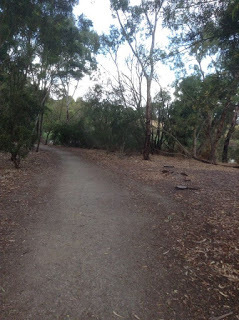
I've been reading 'Henry and Banjo' by James Wright. I discovered that, as a boy, Henry Lawson loved to walk, whether or not he needed to get somewhere. 'Walking was freedom, his escape from the sad box he lived in.' The text goes on to describe how he valued his walks so much because they gave him time to think. 'The mind and feet travel together, as if one is peddling the other,' was young Henry's opinion. I totally agree with him. Fashion has nothing to do with it.
Surely an isolated ten-year-old in the Australian scrub, miles from fashionable civilisation, didn't set off on walks because some faraway British and European authors started recommending them. He wouldn't have had a clue what was going on over there. I'm sure walking is not a fashion so much as something many of us choose for our own benefit and joy.
I started thinking about the time I decided to take up walking more regularly. It was when I was a teenager, and my reason at the time was to stay in shape. I was serious about my writing aspirations back then too, but considered them two things I did separately. I'd go off for a walk to get fit and for a bit of relief from study and brain work. But I soon found out how closely connected walking and writing are. Using my own two feet to travel down a road or trail helps to pump ideas into my head, similar to what Henry Lawson said. Maybe they're sparked by some of the scenery along the way, or maybe it's because the rhythm of my steps cranks up my subconscious mind and helps ideas to flow. I'm sure getting more oxygen moving through my brain doesn't hurt either, especially when I return to my desk or reading chairs.
So walking and writing aren't mutually exclusive activities, but complementary ones which make us more effective the next time we decide to do the other. It's something we know deep down, and even if those trendsetters from the nineteenth century helped to make walking popular, it was surely because they knew the benefits too. In fact, I'm sure people from even earlier times got it too, even if they didn't call it by the names of leisure or sport. You can't convince me that Shakespeare's characters from plays such as 'A Midsummer Night's Dream' or 'The Tempest' weren't ever caught up by the scenery as they had their jaunts through forest or virgin island.
Published on January 03, 2016 14:29
December 31, 2015
'No Ordinary People' by David McLaughlan
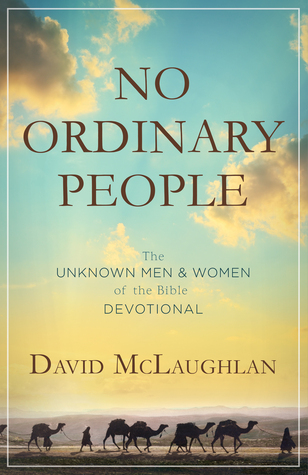
You can learn so much from the successes and failures, lives, humility, and obedience of unnamed Biblical people—and you will find great insights in No Ordinary People: The Unknown Men and Women of the Bible Devotional. This brand-new book features 100 in-depth, easy-to-read entries on the people behind the scenes, the everyday men and women, not the kings, queens, miracle workers, or leaders. These people, from the Good Samaritan to Pilate’s wife, played a powerful role in God’s plan for humanity and their stories were recorded for your benefit today. No Ordinary People can share important, even life-changing, principles for your quiet time.
MY THOUGHTS:
A great start for this year's reviews. What a tribute to nameless heroes and heroines!
This devotional is written in honor of side characters in the Bible who barely get a mention. Maybe their role was over in just a sentence or two, or maybe they were mere observers. When I started reading about them, the one thing they shared in common was impossible not to notice. In almost every case, these individuals weren't named.
To give an idea of the unexpectedness of those chosen, I'll mention just a few. There were Paul's sister and nephew, who somehow slipped through the cracks of my memory, the host of the Passover (you know, the man who owned the upper room where the last supper took place), and the servant girls who taunted Peter in the courtyard. You never know who will pop up in the pages next.
Bible heroes we all know about, movers and shakers in the faith such as Abraham and Moses, Peter and Paul, really are in the minority. They are outnumbered by these faithful folk in the shadows, who are simply living their lives the best way they know how. I feel it gives us permission to be numbered among them, without feeling guilty about not being tallied among the 'great'.
The omission of names is so consistent, you can't help but wonder whether they were withheld in the Bible deliberately, to show that 'making a name for ourselves' isn't the important thing we often make it out to be. These people have gone down in history for their attitudes and actions, which we can all benefit from without knowing whether they were called Hosea or Hananiah, Judith or Jemima.
I love the deep life applications we can take from each story, with great prayers that get to the crux of where each person was coming from. I've often dodged devotionals, feeling that the shortness of the reflections tend to make them a bit trite, but this one is different. I'll be using it every day.
'I know that even if the rest of the world never hears my name, there will be a particular spot reserved only for me in your heart. It is enough,' one of the reflections says. This book convinces me that it really is enough.
Thanks to Barbour Publishing and NetGalley for my review copy.
5 stars
Published on December 31, 2015 08:00
December 28, 2015
Introducing 'Glimpses of Light'
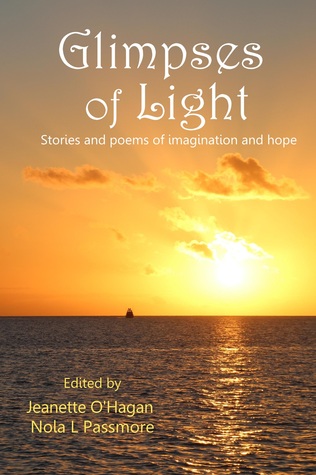
This blog tour was kicked off last week by Nola Passmore, one of the tireless editors of this brand new anthology. You can read her introductory post here. It's my honour to host the second step along the way.
Early this year, submissions were invited for an anthology with the theme of light. I was intrigued and immediately expressed my interest. Then I started pondering the nature of light.
First I thought of the obvious. It's one of those gifts of life we may tend to take for granted, but if it's taken away, as it was during the Egyptian plagues, we realise how much we appreciate and rely on it. Light is essential for health, growth and cell division. That's just a scientific fact, not to mention it's impossible to see without it. If you're blundering around, trying to search for something in the dark, the addition of some sort of artificial, hand-held light is essential for your safety. Even the beam from a candle or torch may help prevent a serious accident, and help you find whatever you're looking for. I appreciated all this, but the question still remained, How am I going to incorporate light into a story or reflection?
Next, I pondered how light extends to the spiritual realm. You may hear somebody state, 'I've come to see the light.' Of course they don't mean the physical light, which surrounds them every day. It's another way of saying that something significant, which was concealed from them, has now been made clear. Wisdom and revelation can serve the same function as physical light, by illuminating what was previously concealed for whatever reason. 'I saw George in a whole new light, and decided to cut him some slack.' That sort of comment, which we hear a lot, expresses the same thing. Where there was previously darkness or misunderstanding, something new has been revealed. That's possibly the crux of this book, using light in all its forms. My own contribution (Moon People) came about as the result of a conversation I had with my husband and kids, which got me probing deeper. If I hadn't been pondering the significance of light, I surely would have overlooked the value of their casual comments.
This book contains contributions from twenty-one authors who have incorporated our personal concepts of light into meaningful pieces of writing. There are works of fiction, including both fantasy and contemporary. Others have written contemplative poems, and thought-provoking creative non-fiction, all shedding light on some aspect of light. Together, we are some of the members of Christian Writers Downunder. Some of us have been writing for a fairly long time and won awards, and others are fresh new voices. And of course, there are stories by the two editors, Nola Passmore and Jeanette O'Hagan, who have worked hard to bring this treat together. We hope you'll consider indulging your curiosity and purchase a copy, as all profits will be donated to Christian Blind Mission Australia, an organisation who helps restore sight to blind people in third world countries.
Next in line in this tour, we'll visit the blog of Jo-Anne Berthelsen, a gracious and prolific communicator, whether through fiction, non-fiction, uplifting reflections, creative non-fiction pieces, or the spoken word. You can visit her here, to get a feeling for her expressive way with words. Her thoughts about this anthology will be shared on Tuesday, January 5th.
Check out the anthology on Goodreads here.
Glimpses of Light Anthology is available here from Amazon in paperback and kindle formats.
Finally, to celebrate the release of Glimpses of Light, I'd like to offer a giveaway of any of my novels to a random commenter. That will be a kindle copy if you are international, or your choice of paperback or kindle if you live in Australia. Please check my Amazon Page to make your choice. (Anyone involved with this anthology in any way, as an author or editor is exempt, the reason being that much as I love these guys, they aren't random :) ) To be eligible, please mention in your comment which of the books you'd like to own. The winner will be chosen by random.org, and announced on this comment thread and the Glimpses of Light facebook page on Tuesday, January 5th, 2016.
Published on December 28, 2015 08:00
December 26, 2015
'A Worthy Heart' by Susan Anne Mason

Maggie Montgomery's long-held wish to see America is finally coming true. She'll visit her beloved brother Rylan and his wife, Colleen, and at the same time, escape Neill Fitzgerald's unwanted attention. In addition, Maggie has a secret! She plans to remain in America to seek her fortune and to hopefully find love. While visiting Irish Meadows, she meets an intriguing man whom she thinks is a stable hand. Only when Rylan demands she stay away from Adam O'Leary does she realize he's Colleen's brother, recently released from prison. Nonetheless, Maggie can't seem to make her heart conform to her brother's request.
Adam O'Leary has never felt worthy of his place in the family. Spending time in jail only reinforces his belief. Now that he's free, Adam hopes to make amends and earn back his family's trust. Falling in love with Maggie Montgomery, however, was never in his plans.
Despite everyone's effort to keep them apart, the two develop a bond nothing can break--but has Adam truly changed, or will the sins of his past prove too much for Maggie to overcome?
MY THOUGHTS:
I looked forward to this book and it lived up to my expectations.
After three years in prison, Adam O'Leary returns home in the spirit of the Prodigal Son, but anyone who's read Irish Meadows can predict that James O'Leary won't be anything like the father in the parable. Quite the opposite, in fact. Poor Adam has learned firsthand that when you let resentment control your actions, it ends up rebounding back on you, rather than the people you aim it at.
I love series in which former bad boys and rebels become heroes of their own stories. In the first book, we get to see what everyone else sees, which is just enough of Adam to get the impression that he's a pain in the neck with a major chip on his shoulder, whose uptight presence casts a pall whenever he appears. But in this book, his heart and feelings get a chance to shine.
People's attitudes toward ex-jailbirds appear to have mellowed over the years, which I'm glad to see. Gross over-reactions seem to have been the norm in 1914. Just being seen with Adam would have been enough to tarnish Maggie's reputation forever. Come on, turn of the century people, get a grip! James' deplorable attitude is predictable at least, but at times, I even felt like shaking the charming Montgomery brothers for the judgmental stances they chose to take. Of course they were products of their time who were concerned for their sister.
I was all set for Adam to perform some heroics from the start. His reception was so frosty, I knew the bar would be set high for him to win back people's esteem. It was greatly satisfying to see him do it, yet on the other hand, how sad that he had to. It was a shame certain other characters couldn't have embraced him without him needing him to step up in crisis situations, but that's what makes an excellent story.
The best part is that, with Maggie, he doesn't have to prove himself worthy. I love her as well as Adam. She's been told about his sordid past and the scandals surrounding him, but chooses to trust her own intuition and personal experiences with Adam, and not care about all that hearsay. (Not to mention the chemistry between them is very well-written). She's also bold, sweet and kind. And she has her own problems, which add a lot of tension and a feeling of impending trouble.
I loved the instant attraction appeal for a change. My shelf is full of books with antagonists who hate each other on sight, but eventually fall in love. Much as I enjoy them, it's refreshing to come across a story where the attraction is immediate. Maggie and Adam have no problems figuring out how they feel about each other. It's other people's problems with their relationship which causes hassles for them.
Overall, it's another fantastic read with the help of some shocking back-story plus a very nasty villain.
I was cheering so hard for Adam and Maggie by the end, and the secondary romantic plot, with Gabe and Aurora, was pretty good too. (Remember Aurora from Irish Meadows, as the girl Gilbert almost got hitched to?) I believe this will be a trilogy, and I can't wait for the third.
Thanks to Bethany House and NetGalley for my review copy.
5 stars
Published on December 26, 2015 17:32
December 21, 2015
To Swear or not to Swear

First, I want to make it clear that I don't take offense at such things easily. I'm not the sort of reader who will throw a book aside if one or two swear words slip through, no matter how much I've been enjoying it. If the story and characters are good, it will keep me hooked. However, the more I think about it, the more I believe that swearing and profanities are never needed in literature, no matter how sparse or thick. Since words are well known to be containers of power, why sully your work by choosing negative or crude ones? It may be argued that they add emphasis, but so do thousands of other descriptive words that could be used in their stead.
I hate it when they are spread thickly all through the book, several times per page, with f-bombs gushing forth whenever a character opens his mouth. This is what I've sometimes found from popular best sellers I've picked up on impulse. Not only is it an overload of crassness and vulgarity, but it quickly gets old. Even if a character uses an innocuous word such as 'awesome' or 'amazing' in every sentence, I feel the same. The English language is vast, and this person is seriously limited in the way he uses it. Can't he pull anything else out of the bag?
Yet when they are used less frequently, or only in heated moments by characters under great stress, it still doesn't really work either. I think this is because a swear word from a character who rarely uses them hits me like a smack in the face. By the time I've finished blinking and thinking, 'Whoa, that's strong language for Fred,' my attention has been pulled from the flow of the story. It may be only a fraction of a second, but still needs to be drawn back.
I certainly get it when authors say, 'It's a matter of authentic characterisation and Mr X is a character who would swear like a trooper.' It's a challenge to get the feeling of a character across without the use of swearing, but I've often seen it done. Nobody puts in every 'uh' or 'um' a character would use in reality, so it's the same with bad language. The speech in novels has an illusory quality about it at the best of times. It's very possible to give the impression that someone is desperate, rough, cut-throat or furious without filling their mouths with foul language. Christian or children's fiction, for example, has some of the cleanest mouthed thugs, villains and desperadoes to be found anywhere, but they still work if the description and plot are sound.
During the last election, we were discussing political candidates around the dinner table. Some of our family members were put off a particular fellow because he swears. 'I wouldn't want a gutter-mouthed person as our leader, no matter what his policies are.' Whether or not this attitude is short-sighted, it would seem like an easy thing for a politician to fix if it bothers a substantial group of people. It's probably safer for them not to swear at all, if they want to pick up as many supporters as possible, and not that big a sacrifice. Sure, he has many supporters who don't mind his bad language and use it themselves. But they are unlikely to decide, 'I'm not going to support this candidate because he doesn't swear enough!' That's a ludicrous thought. He's most likely to pick up the maximum number of supporters by keeping his mouth clean.
I believe it's the same with the language used in novels. You hear people say, 'I don't read this author's books because I don't like all the swearing in them.' But it's pretty rare to hear, 'I don't read this author's books because his characters don't swear.' If you can pick up the maximum number of fans by keeping it clean, you'd be crazy not to do it.
Published on December 21, 2015 16:49
December 16, 2015
'The Blue Castle' by L.M. Montgomery
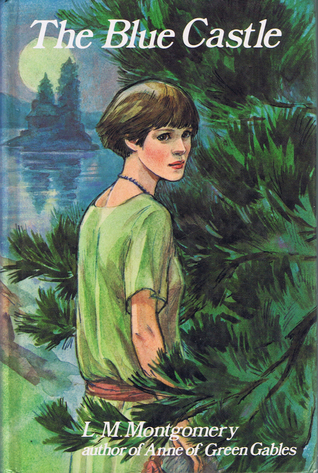
Because it was L.M. Montgomery's date of birth a couple of weeks ago, I got nostalgic and pulled a book from shelf I haven't read in years.
Valancy lives a drab life with her overbearing mother and prying aunt. Then a shocking diagnosis from Dr. Trent prompts her to make a fresh start. For the first time, she does and says exactly what she feels. As she expands her limited horizons, Valancy undergoes a transformation, discovering a new world of love and happiness. One of Lucy Maud Montgomery's only novels intended for an adult audience, The Blue Castle is filled with humour and romance.
MY THOUGHTS:
I just noticed that the Goodreads blurb called this one of Montgomery's only novels for an adult audience, and I agree with that. In spite of the recommendation at the start of my paperback, and how quick it is to read, I believe this book may be more special for adult women than girls around 12. I read it when I turned 13, and have just re-read it now. It was far more meaningful the second time. Although I enjoyed it, Valancy's plight didn't pack the same punch at that age. I was able to understand it with my head, but I'm sure it took more life experience under the bridge to grasp it with my heart.
We may think of Valancy's dreadful Stirling clan as the type of funny caricature LMM knew how to write so well, but the funny thing is we recognise people out there like them! Walking, talking, one-sided caricatures, in our families, workplaces and communities. And many of us are taught from a young age to put such a lot of faith in what say about us and how they treat us.
I love the way Valancy approaches her transformation. She knows what to focus on. People's opinions of her were part of what caused her narrow, henpecked life, but she knows better than to attempt what so many of us think is logical, to fix things by changing people's opinions. She makes the more wise move, and decides that as we have so little control over other people's opinions, she'll simply shrug them off and live a life more true to her inner values.
Sometimes we need to ask for what we want. I'd forgotten the way Valancy did that. She didn't dare change her life until she believed she had nothing to lose.
Barney Snaith is full of appeal from our first glimpse of him. He's genuinely content and happy, despite the way people look down their noses at him and invent a horrifying reputation, while Valancy has been miserable her whole, squeaky clean, obedient life. By the end, I was thinking he deserves to be ranked up there with literature's great, romantic heroes. I had to laugh when I read what another reviewer wrote, that his lack of acclaim might be to do with his stodgy name (although in recent years we have Barney Stinson from 'How I Met Mother sitcom, whose name is similar, and has enjoyed a lot of popularity). Anyway, I'm sure Barney Snaith wouldn't even want to be on a list with the likes of Edward Rochester, Fitzwilliam Darcy and Rhett Butler, so he might be glad people didn't put him there.
Published on December 16, 2015 20:03
December 13, 2015
'The First Christmas Carol' by Marianne Jordan
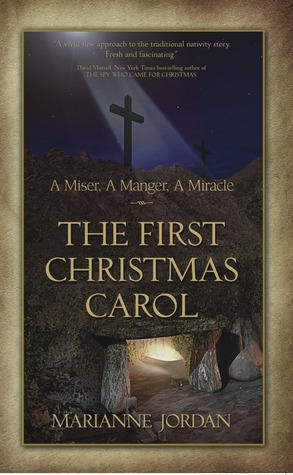
2015 Reading Challenge, Week 50, A Book set during Christmas time.
And this marks the end of my challenge this year. Yahoo!!
Matthew, Mark, Luke, and . . . Dickens?
In an interpretive retelling of this familiar Christmas story the author asks: What if there was room at the inn? The First Christmas Carol combines a timeless work of classic literature with the first documented Christmas story. As darkness cloaks the hills of Bethlehem three angels visit an unscrupulous innkeeper, revealing his past, present, and the miracles yet to come.
Not the story you've read. Still the stories you know.
MY THOUGHTS:
This is a blend of the traditional Christmas story with Charles Dickens' 'A Christmas Carol', which translates to ancient Palestine quite easily.
Ebenezer is the cranky, money-hungry inn-keeper who's doing his utmost to turn the census situation into a personal profit. He'll rip travelers off with exorbitant prices and refuse to give any charity, now matter how needy those who may come before him. Of course, we all know who's going to show up with the donkey, exhausted and with the birth of a baby approaching.
Ebenezer's employee Aaron, this story's Bob Cratchit character, takes pity on the couple and guides them to the stable, at the urging of his lame son, Timothy. And Isaac is Ebenezer's well-meaning nephew, who he's always rejected because the boy's birth caused his sister's death.
While Mary and Joseph are settling down in the stable, Ebenezer is being visited by three angels who have some things to show him. It's a fun Christmas read. I've been reading it with my eleven-year-old son, who isn't familiar with 'A Christmas Carol' yet, as Dickens' language has seemed a bit lofty and wordy so far. It's fun to see him enjoy the story in an easy flowing setting.
4 stars
Published on December 13, 2015 19:34
December 9, 2015
'Until the Dawn' by Elizabeth Camden

A volunteer for the newly established Weather Bureau, Sophie van Riijn needs access to the highest spot in her village to report the most accurate readings. Fascinated by Dierenpark, an abandoned mansion high atop a windswept cliff in the Hudson River Valley, Sophie knows no better option despite a lack of permission from the absent owners.
The first Vandermark to return to the area in sixty years, Quentin intends to put an end to the shadowy rumors about the property that has brought nothing but trouble upon his family. Ready to tear down the mansion, he is furious to discover a local woman has been trespassing on his land.
Instantly at odds, Quentin and Sophie find common ground when she is the only one who can reach his troubled son. There's a light within Sophie that Quentin has never known, and a small spark of the hope that left him years ago begins to grow. But when the secrets of Dierenpark and the Vandermark family history are no longer content to stay in the past, will tragedy triumph or can their tenuous hope prevail?
MY THOUGHTS:
This is the type of plot where the main characters start off at odds, but we can understand both sides. Sophie has been involved in the caretaking of the property, Dierenpark, since she was a child, and is just doing what she's always done. Quentin is aghast at what appears to be the exploitation of his family's misfortune by those who work on the property. We know there are bound to be fireworks, but I loved the deeper aspects which kept being introduced.
There's the historical aspect. The story is set when weather predictions were in their infancy, and Sophie is one of many volunteers across the country who collect data, helping the Weather Bureau to fine-tune their accuracy. It's interesting to see the dedication behind something we now take for granted.
Then there's the psychological aspect, getting us pondering about the nature behind a good mood. Both protagonists have had rough experiences, but Sophie chooses to focus on the benevolence in the world, while Quentin intially hones in on his hard knocks. We've each got to make up our minds whether we choose to regard the world as a friendly or hostile place. That's at the bottom of many lively exchanges between Sophie and Quentin.
That leads to the supernatural aspect. The property, Dierenpark, is regarded as a beautiful, fertile haven because of some sort of blessing taking place in a hidden realm, challenging even Quentin to wonder whether or not something is happening just beyond the reach of his senses. Even the oysters show signs of prosperity here, although I don't fancy swallowing them straight from the shell, as so many of these characters love to do.
The attitudes of all the different characters help make this book. Quentin is all about realism and science, evident in the lesson he keeps trying to pound into his son. Kid characters don't always come across believably or sympathetically in novels, but Pieter is great. Grandpa, Nickolaas, is into all sorts of weird, spiritual theories, with the money to chase them up. Then there's Sophie, with her attitude which strikes Quentin as so naively cheerful. He could have called her a Pollyanna, if those Pollyanna books had been written back then.
My only gripe was a few loose ends which I wish had been tied up, including a fairly intense argument between Sophie and Quentin, which we're left to assume was simply brushed under the carpet or forgotten about. I wished it hadn't happened, at that stage in their understanding. Even the matter of the bee hives wasn't really returned to. I won't say more, for fear of plot spoilers.
Anyway, I had to laugh when Sophie grouchily reflected that all Quentin had going for him was intelligence and a sense of humour, to which she couldn't help adding the obvious good looks and wealth. In the eyes of many ladies, surely that would be enough! It shows just how much a sour, cranky attitude can overshadow, and how easy it was to become a Quentin fan when he started dealing with it.
Thanks to Bethany House and Net Galley for my review copy.
4.5 stars
Published on December 09, 2015 16:01
The Vince Review
Author, blogger, reader, reviewer, mother of three. All this goes under the mantle of 'stay at home mum'. I also love walking and cooking when the mood strikes me. Getting stuck into a good book has a
Author, blogger, reader, reviewer, mother of three. All this goes under the mantle of 'stay at home mum'. I also love walking and cooking when the mood strikes me. Getting stuck into a good book has always been one of the best things ever.
I invite you to treat this blog like a book-finder. People often ask the question, "What should I read next?" I've done it myself. I try to read widely, so hopefully you will find something that will strike a chord with you. The impressions that good books make deserve to be shared.
I read contemporary, historical and fantasy genres. You'll find plenty of Christian books, but also some good ones from the wider market. I also read a bit of non-fiction to fill that gap between fiction, when I don't want to get straight on with a new story as the characters of the last are still playing so vividly in my head. ...more
I invite you to treat this blog like a book-finder. People often ask the question, "What should I read next?" I've done it myself. I try to read widely, so hopefully you will find something that will strike a chord with you. The impressions that good books make deserve to be shared.
I read contemporary, historical and fantasy genres. You'll find plenty of Christian books, but also some good ones from the wider market. I also read a bit of non-fiction to fill that gap between fiction, when I don't want to get straight on with a new story as the characters of the last are still playing so vividly in my head. ...more
- Paula Vince's profile
- 108 followers



